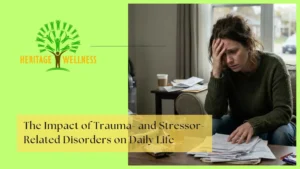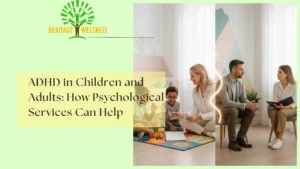Depression is a serious mental health condition that affects millions of people worldwide. While many individuals experience occasional sadness, depression is characterized by persistent feelings of hopelessness, low energy, and a lack of interest in daily activities. If left untreated, depression can significantly impact a person’s quality of life, relationships, and overall well-being. It’s essential to recognize the signs of depression early so that help can be sought promptly.
In this article, we will explore common signs of depression that should never be ignored and how therapy can play a crucial role in managing and overcoming this condition.

1. Persistent Feelings of Sadness or Hopelessness
One of the hallmark signs of depression is a persistent feeling of sadness that lasts for weeks or months, rather than a temporary mood shift. Individuals with depression often feel overwhelmingly hopeless or helpless, believing that things will never get better. This sense of despair can impact daily functioning, making it difficult to engage in everyday activities.
How Therapy Can Help:
Therapy provides a safe space for individuals to explore their feelings of sadness and hopelessness. Cognitive-behavioral therapy (CBT) helps individuals identify negative thought patterns and replace them with more balanced, positive perspectives. Therapists work with clients to challenge irrational beliefs and develop coping strategies that reduce feelings of helplessness.
2. Loss of Interest in Activities Once Enjoyed
A common symptom of depression is a loss of interest or pleasure in activities that were once enjoyable, such as hobbies, socializing, or even work. This lack of interest is known as anhedonia, and it can be one of the most significant signs of depression. People with depression may find it challenging to get excited about things they once loved, leading to isolation and a further decline in mental health.
How Therapy Can Help:
Therapists help individuals reconnect with their interests by guiding them through behavioral activation exercises. This type of therapy encourages individuals to engage in small, positive activities each day, gradually rebuilding their sense of purpose and enjoyment. Over time, these activities can help individuals regain their motivation and find joy in life again.
3. Changes in Sleep Patterns
Depression can significantly affect sleep, causing either insomnia (difficulty falling or staying asleep) or hypersomnia (excessive sleepiness or oversleeping). These changes in sleep patterns can worsen depression, leading to fatigue, lack of energy, and difficulty concentrating.
How Therapy Can Help:
Therapy can help address the root causes of sleep disturbances, such as racing thoughts or anxiety. Cognitive-behavioral therapy for insomnia (CBT-I) is a structured approach that helps individuals improve sleep habits and address thoughts that may interfere with restful sleep. By working with a therapist, individuals can develop healthier sleep routines and improve their overall quality of rest.
4. Fatigue or Lack of Energy
Depression often causes individuals to feel constantly tired, even after a full night’s sleep. This overwhelming fatigue can make it difficult to perform everyday tasks or get out of bed. A person may feel mentally and physically drained, and even simple chores may feel like an insurmountable challenge.
How Therapy Can Help:
Therapists work with individuals to break the cycle of fatigue by developing strategies to manage energy levels. In therapy, individuals may learn relaxation techniques, mindfulness, and behavioral interventions that help reduce stress and conserve energy. A therapist may also help individuals identify and address any underlying issues contributing to their fatigue, such as poor nutrition or excessive worry.
5. Irritability and Mood Swings
People with depression may experience mood swings, becoming easily irritated or upset over minor things. This irritability is often accompanied by feelings of frustration or anger, which can strain relationships with family, friends, and colleagues. These mood changes are often a result of the internal emotional turmoil that accompanies depression.
How Therapy Can Help:
Therapy can help individuals develop better emotional regulation skills. Techniques such as mindfulness and emotion-focused therapy can assist in recognizing and managing intense emotions. Additionally, therapists work with clients to improve communication and interpersonal skills, reducing conflict in relationships and improving emotional well-being.
6. Physical Symptoms Without a Clear Medical Cause
Depression often manifests in physical symptoms such as headaches, back pain, digestive issues, and muscle aches. These physical symptoms are real but are often linked to emotional and psychological stress rather than a physical condition. In many cases, doctors may struggle to identify a clear medical cause for these ailments, leading to frustration.
How Therapy Can Help:
Therapy can address the mind-body connection, helping individuals reduce the physical impact of depression. Psychodynamic therapy, mindfulness, and relaxation techniques can help individuals manage physical symptoms by alleviating stress and anxiety. In many cases, therapy can reduce the frequency and intensity of these symptoms by treating the underlying emotional factors contributing to them.
7. Thoughts of Death or Suicide
In severe cases, depression can lead to thoughts of death or suicide. These thoughts are alarming and require immediate attention. If you or someone you know is experiencing suicidal thoughts, it’s crucial to seek professional help as soon as possible.
How Therapy Can Help:
Therapists work with individuals who are struggling with suicidal thoughts to provide a safe space to express their feelings. Suicide prevention therapy often involves developing coping strategies, addressing underlying causes of distress, and ensuring the individual has access to the proper support system. Cognitive-behavioral therapy and dialectical behavior therapy (DBT) are effective therapies for individuals struggling with suicidal thoughts, as they help individuals reframe negative thoughts and develop healthier emotional coping mechanisms.
8. Social Withdrawal
Depression often leads to social withdrawal, where individuals avoid social situations, isolate themselves, and may feel disconnected from loved ones. This social isolation exacerbates feelings of loneliness and can make depression even worse.
How Therapy Can Help:
Therapists can help individuals address feelings of isolation by encouraging social engagement and providing tools for improving social skills. Therapy may also involve exploring past experiences that contribute to feelings of loneliness and building a support network that fosters connection and trust.
Conclusion
Depression is a serious condition that affects every aspect of an individual’s life. Recognizing the signs of depression and seeking therapy is crucial to managing the condition and improving overall well-being. Therapy offers valuable support in addressing the underlying causes of depression, developing coping strategies, and providing individuals with the tools they need to live a fulfilling life. If you or someone you know is struggling with depression, don’t hesitate to seek professional help. Therapy can help you regain control of your life, overcome the challenges of depression, and build a brighter future.







One Response